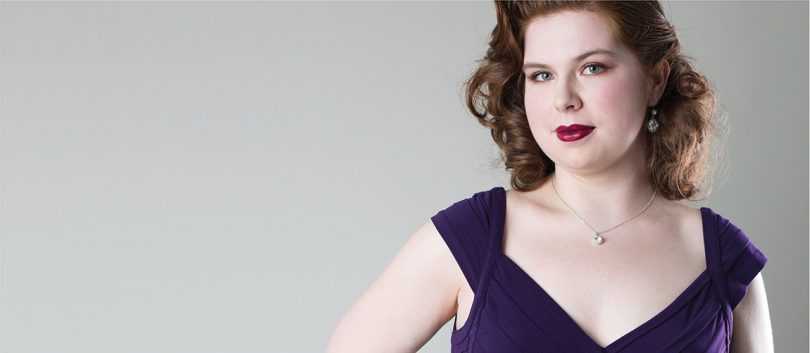On the heels of an upcoming tour, the vintage pop vocalist dishes on her roots, her health habits and what she’s up to next.
“I would have to say I seriously began to sing when I was around 4 or 5,” says September Foster, who remembers Reba McEntire’s “The Night the Lights Went Out in Georgia” as the first song she ever belted out.
“It’s not a tune you’d necessarily think a toddler would love, but I was very passionate about it—and I still am.”
The Making of a Singer
Described as having a voice beyond her years, Foster says that singing always felt organic. Her mother was a vocalist who performed at community events along the west coast of the United States and on Christian television.
As a child, her mother, grandmother and great grandmother nurtured that same creativity into Foster. Her mother encouraged her to grow her voice while her elders taught her not to fear performing before crowds.
As a young vocalist, did you sing throughout your school years?
Music was part of my curriculum from kindergarten through high school. Because I was home-schooled, I was also involved in several performing arts programs that helped me hone my singing skills when I was young.
What was your first public performance and how did it go?
I believe my first performance was around age 6 when I was invited to sing at the Hollywood Brown Derby in Disney’s Hollywood Studios. I sang “Over the Rainbow” from the Wizard of Oz, and the audience was great and very welcoming!
Tell us about your training.
I received a great performing arts education through private teachers, including alumni of the Metropolitan Opera and the College of William and Mary. From a very early age, they gave me university-level music theory, advanced operatic training and musicianship. I’m grateful for the head start I was given with that level of material, and I’m still continuing to pursue my performing arts education.
The Shaping of a Singer
Foster aspires to be like one of her favorite vocalists: Billie Holiday. She notes Holiday’s ability to deliver a song that can make you “feel heartache and happiness in the same breath” as her source of inspiration from the late jazz vocalist’s style. Foster possesses an authentic vintage beauty akin to Holiday and reminiscent of the performers of the 1930s and 1940s from which her shtick was derived. “I think it’s easy to be influenced by artists you like,” says Foster, “and I try to put that influence into a positive place.”
Her presentation and showmanship are a small portion the collective elements it takes to shape a vocalist. In private, after the practices and voice training, stands the unseen and less glamorous part of the profession—a deliberate health regimen that helps to keep Foster performing at the top of her game.
As a vocal performer, do you adhere to a strict nutritional regimen? What is it?
I’ve read that even some of the most seasoned of music acts have steered away from the stereotypical “rock star” lifestyles in order to have longevity in their performing careers. That’s something that I do think about quite a bit in regards to my health. I usually have four to five small meals a day, depending on how long of a day I’m going to have. I incorporate mostly organic fruits and vegetables into my nutritional plan, along with plenty of salmon and grilled chicken. Substituting meats for protein-alternative foods like lentils, quinoa, farro and hummus help with my energy levels; however I do avoid eating red meat and dairy products. To me, it doesn’t feel restrictive and my nutritional plan always contains varieties of locally grown produce and healthy alternatives to “normal” foods. By making different dietary choices, I’m more readily able to perform to the best of my ability, and that always translates to a better show!
How does a singer’s health effect musicianship?
That’s a great question that not many touch on. Just like an athlete can’t be as agile if they are eating poorly, or are not following their practice regimen, so it can be with musicians and their ability to express their music. Our voices in particular can’t move as smoothly from note to note or have a lot of resonance if they aren’t taken care of. It requires a lot of pre-planning to be health-conscious and musically conscious at the same time, but in the end it’s definitely worth the extra effort. Just imagine someone like Placido Domingo [of Three Tenors fame] having poor diaphragmatic control! It’s essential to treat our bodies well to power our voices.
Lengthy performances must affect your body. How do you prepare for those?
Sleep, rest and hydration! Over the years, I’ve come to realize how important sleep can be to recover from long rehearsals and/or performances. Even when I want to continue rehearsing for several hours, I know that I need to take a break at a certain point to allow for recovery time. Stretching and warming up my body periodically throughout a long day are also very helpful.
Nutrition-wise, I like to eat a rice or vegetable pasta tossed with a little sunflower oil the night before a show. After a performance, a typical dinner for me is grilled salmon, kale and a baked potato. I try to sleep at least seven hours that night so I can feel rested and ready to go again the next day.
Which foods should a vocalist avoid before a performance and for how long?
There are quite a few, but the main one is dairy. This includes milk, cheese, whey, yogurt, ice cream, milkshakes and so on. This is because it creates a type of mucus-production that causes our vocal chords to feel sluggish and unstable. Usually you’d want to avoid them for at least 24 hours before a performance.
Interesting. So which foods inhibit vocal performance?
In my experience, I’ve found that hot sauce, coffee, black tea, barbecue sauce, anything that contains dairy and heavy foods really inhibit your voice. In a lot of ways they are harsh to the throat, especially right before you’re set to sing. If you do accidentally have something that you think might affect your voice, drink lots of water, and eat a fruit with pectin in it, like an apple. Usually that can clear up almost anything.
What role does hydration play in performance? Are there types of drinks to avoid?
Hydration plays a huge role! If a singer is dehydrated, it’s like trying to drive a Ferrari with very little oil in the car. There will be significant damage to the engine. Drinking several cups of room temperature water at least two hours before a performance is usually sufficient, but everyone is different when it comes to their hydration levels. I drink homemade chicken broth an hour before and keep drinking water until I step on stage. I generally steer clear of black teas, sodas or any drink that might cause dehydration on the day of a show.
How do you protect your voice from strain?
Before a performance, whether it is a single song appearance or a 45-minute set, I gently warm my voice up by doing scales and cool them down by humming for a few minutes after the performance. Like an athlete, warming up and cooling down is key. Also having good voice teachers instill the values of breath control, tonal quality, resonance and proper posture have helped me gain a richer quality in my voice over the years. In everyday conversations, I like listening to people and their stories, so it helps that I don’t put unnecessary stress on my vocal chords by talking too much.
How does regular exercise benefit voice performance?
I’m not a physician in any way, but from what I’ve experienced and researched, singing is so great for your heart, brain and lungs collectively. Exercise should be used as something in a vocalist’s toolkit for staying in tip-top performance shape, and the results really pay off if you are using your muscles and getting a good amount of oxygen into your system. Mild to moderate exercise is wonderful to keep up your lung capacity for singing, and my favorite ways to exercise are walking, skipping and tap-dancing.
What’s next?
Foster loves performing, calling it exhilarating. She loves the energy, the audience and enjoys seeing how her music touches people. She’s performed at sporting events, Walt Disney World, Colonial Downs, the Hampton Coliseum, Kaplan Arena, for the military and at events for Fortune 500 companies. She owns her slice of the American Dream and calls herself blessed.
This summer, she’s kicking off her “I’ll Be Seeing You” Tour to benefit childhood literacy, youth athletics and military veterans.
She has a GoFundMe campaign in place to help with costs and her tour dates will be released this spring on her ReverbNation page as they are confirmed.
Called “a powerful young talent” by the Daily Press, Foster’s old soul, classic look and gentle demeanor are infectious. Coupled with her vocal talent, it all encompasses her goal.
Concludes Foster, “I want to make my audiences feel the way my favorite artists make me feel—filled to the brim with life.”
Connect
Twitter twitter.com/septemberfoster
Instagram instagram.com/septemberfoster
About.Me about.me/septemberfoster
ReverbNation reverbnation.com/septemberfoster
Support
“I’ll Be Seeing You Tour” gofundme.com/septemberfoster







